-
The F/W 2026.27 Show Schedules...
New York Fashion Week (February 11th - February 16th) London Fashion Week (February 19th - February 23rd) Milan Fashion Week (February 24th - March 2nd) Paris Fashion Week (March 2nd - March 10th)
You are using an out of date browser. It may not display this or other websites correctly.
You should upgrade or use an alternative browser.
You should upgrade or use an alternative browser.
Sarah Paulson
- Thread starter jexxica
- Start date
Not Plain Jane
Well-Known Member
- Joined
- Mar 3, 2010
- Messages
- 15,481
- Reaction score
- 849
she looked beautiful at the tony's
yes, her relationship with holland is certainly interesting. they are more than 30 years apart, and it's only paulson's second relationship with a woman.
yes, her relationship with holland is certainly interesting. they are more than 30 years apart, and it's only paulson's second relationship with a woman.
Benn98
Well-Known Member
- Joined
- Aug 6, 2014
- Messages
- 42,582
- Reaction score
- 20,805
they are more than 30 years apart, and it's only paulson's second relationship with a woman.
Wow, didn't know that!! They make such an adorable couple.
Not Plain Jane
Well-Known Member
- Joined
- Mar 3, 2010
- Messages
- 15,481
- Reaction score
- 849
bad hair ... it ages her.
catherine88
Active Member
- Joined
- Jun 11, 2011
- Messages
- 9,960
- Reaction score
- 10
My fav look of her recently.
Nymphaea
Well-Known Member
- Joined
- Oct 30, 2012
- Messages
- 6,196
- Reaction score
- 695
The Edit by Net-A-Porter
December 7, 2017
She Who Dares
Model Sarah Paulson
Photographer Victor Demarchelier
Styling Charles Varenne
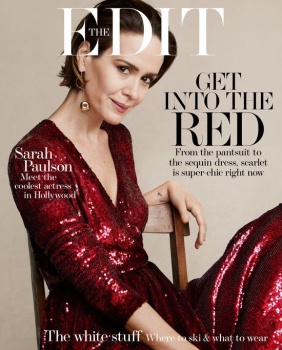
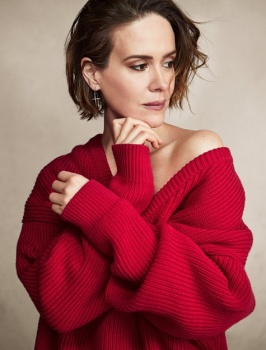
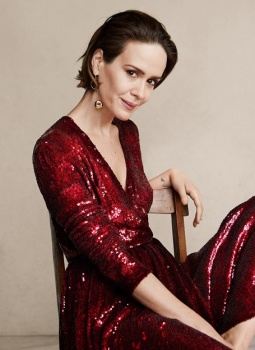
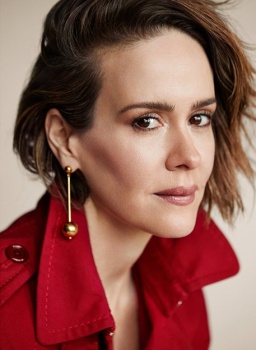
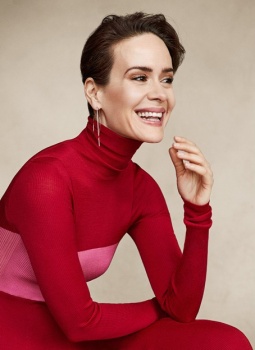
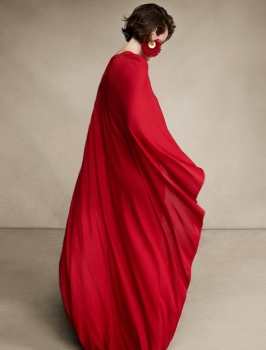
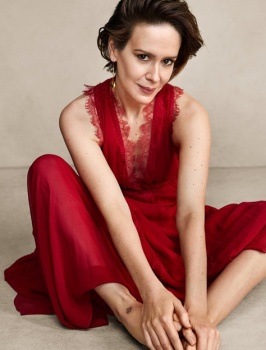
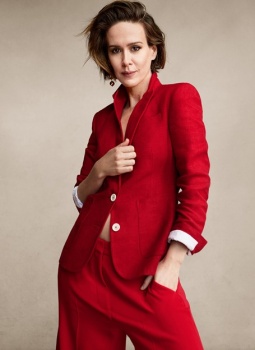
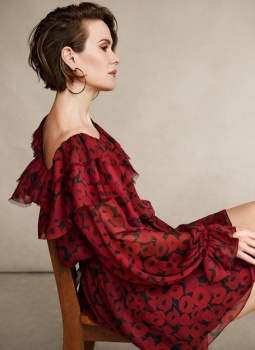
December 7, 2017
She Who Dares
Model Sarah Paulson
Photographer Victor Demarchelier
Styling Charles Varenne









net-a-porterWith a résumé that embraces everything from a heroin-addicted ghost to O.J. Simpson, Sarah Paulson doesn’t exactly toe the Hollywood line. The Emmy Award winner talks to Jane Mulkerrins about her unconventional choice.
WhatsApp groups don’t come much more envy-inducing than one particular thread on Sarah Paulson’s phone. Titled ‘O8’ – as in Ocean’s Eight, the film due out next summer – it is a solidly A-list chat between Paulson and her co-stars: Sandra Bullock, Anne Hathaway, Cate Blanchett, Mindy Kaling, Helena Bonham Carter, rising star Awkwafina, and Rihanna.
“I’m not going to lie, it is a very cool chain to be part of,” Paulson nods, looking a little sheepish, as if barely able to believe her membership. “We can go weeks without a chirp, then someone sends one message, and it’s like – ‘brp, brp, brp’ – your phone just blows up for hours.”
Paulson plays Tammy, one of the seven women recruited by Debbie Ocean (Bullock), to carry out a heist at the Met Gala. It’s an infinitely more mainstream blockbuster than most of 42-year-old Paulson’s previous work.
“I’ve always fancied myself a journeyman actress; a working character actress,” she muses. “Early on in my career, people couldn’t place me. I had long blond hair like every girl in Hollywood. I looked like four different actresses all rolled into one. I wasn’t standing out in any way.”
That is impossible to fathom now. Paulson made her name playing serious, competent women in cerebral dramas – the political journalist Nicolle Wallace in Game Change; Cate Blanchett’s former lover in Carol – alongside a parade of dark, weird characters, including a heroin-addicted ghost, a psychic, and a pair of conjoined twins in the cult anthology series American Horror Story. Then, last year, her star was given a meteoric boost via her role as prosecutor Marcia Clark in smash-hit miniseries The People v. O.J. Simpson, for which she won an Emmy Award.
Paulson is candid about the effect that playing the iconic lawyer has had on her life, though is endearingly uncomfortable describing it. “The difference in terms of my recognizability and my...oh, this is a disgusting word…” – she rolls her eyes – “my profile. It definitely all changed.”
We’re in Manhattan, on the first truly frigid day of the season. Paulson has been shooting The Edit’s cover story, and is apologetic for having now changed into leisurewear. Not only is it perfectly excusable – she’s flying home to La shortly, overnight, for just 24 hours to attend an event – but this is mighty stylish leisurewear: sweatpants by Rag & Bone; overcoat by Acne Studios; a scarf by Valentino; Céline sneakers.
The day we meet, new revelations have emerged about sexual abuse and harassment in Hollywood. “I think that’s what happens when you take the top off something that’s been pressurized for a long time,” observes Paulson. “But there is one positive coming out of this, and that is this knitting together of women. There’s this feeling of being really supported by other women, and that’s incredibly powerful. It’s very clear that there’s a new world order.”
Next up, Paulson stars in The Post, playing Tony Bradlee, the wife of former Washington Post editor Ben Bradlee. While any film examining power and corruption would feel timely and prescient, The Post seems particularly so. Directed by Steven Spielberg, starring Tom Hanks as Ben Bradlee and Meryl Streep as publisher Katharine Graham, it is the story of the Pentagon Papers, leaked government documents about America’s involvement in the Vietnam War, and the newspaper’s battle to publish them. It is also, inadvertently, something of a feminist narrative.
“Katharine Graham was the first woman to hold the position of publisher in our country, and had to make a huge decision that could potentially cost her the family business,” says Paulson. “It was a very bold decision on her part to publish, and absolutely the right one. She had real integrity and conscience and heart.”
In person, though highly articulate, and with so much to say that her words often tumble out, torrent-like, Paulson is a far cry from the serious characters she frequently inhabits. She’s a fizzing bundle of positive energy, prone to mimicking my British accent (mimicry is one of her favorite pastimes, and she’s very skilled).
Which is not to say the actress lacks focus; far from it. “I come from a family of women who want things,” she says, matter-of-fact. “I am ambitious and unsatisfied in general. I’m not often content with anything the way it is; I always want more. I dreamt about holding an Emmy for a long time. As a kid, I dreamt about holding any kind of statue: I would practice holding an Oscar in the bathroom.”
Paulson was born in Tampa, Florida, but moved to New York aged five with her mother, Catharine, and younger sister, Liz, when her parents divorced. They lived in Queens, where her mother worked as a waitress and took writing classes. At first, all three slept on mattresses on the floor.
“I don’t think I would ever have been as brave as my mother was,” Paulson says, with some wonder. “She was born in Alabama, and grew up in Florida, neither of
which she felt was home; she just had to get to New York City, because that’s where she felt she belonged. She was 27 and she had five-year-old and a three year-old. My sister and I both benefited enormously from that want in her.”
Paulson’s mother, now based in upstate New York, is currently writing a novel, while her sister is senior vice president of casting at 20th Century Fox in La.
At 12 years old, a teacher at Paulson’s school, where she was heavily involved in drama, suggested she apply for the Fiorello H. LaGuardia High School of Music & Art and Performing Arts, aka the Fame school. Though she “wasn’t going to class and smoking a lot in Central Park” in her final years, she landed her first role soon after graduating, as an understudy on Broadway.
Her aspirations back then, though, were firmly mainstream: she had posters of Julia Roberts plastered all over her high-school locker. “I found her so charming and witty and winning,” says Paulson, before letting out a hearty laugh. “And, at the time, people told me I looked like her. So, there was a slight narcissistic connection in my brain. I thought maybe I could play her sister or something.”
But she found the glitzy leading lady was not often the role that came her way. “The two times I was ever asked to play a romantic lead on a Tv show, I auditioned as a brunette and they wanted me to go blond,” she once said. “One wanted me to put these giant mermaid-like extensions in. And I put up with it then because of my desperation to work.”
But when Ryan Murphy, the man behind Nip/Tuck and Glee, cast Paulson in three episodes in Season 1 of American Horror Story, she quickly became something of a muse; she has been a central part of his cast for all five subsequent seasons. And not once has he asked her to do something that would make her ‘more attractive’.
“Ryan’s not interested in all the things most people are interested in, which means, if you’re a little bit off-center, he’s liable to gravitate towards you,” she says. Does she see herself as off-center? “I think so. My life choices are, um, unconventional. I’m with a much older person [her girlfriend of two years is actress Holland Taylor, 74] and people find that totally fascinating and odd, and, to me, it’s the least interesting thing about me,” she shrugs. “But I do feel a bit unconventional. I am a woman of a certain age who chose not to have children, and who has made my career my priority. I am the captain of my own ship, and I’ve never looked to anyone else to validate that, or tell me it’s okay.”
She has always resisted being pigeonholed or defined by her sexuality. Before Taylor, she was with actress Cherry Jones, 19 years her senior, for five years, and before that, she dated mainly men. “Early on, when people found out I was with Holland, some said: ‘I think you have to be careful, I’m afraid it’s going to affect your career negatively’. I was like, what? It never occurred to me at all.”
But she did have a moment of self-doubt during her acceptance speech at the Emmys. She wondered whether to say, onstage, ‘I love you’ to Taylor. “It occurred to me, should I not do that?” she says, still looking puzzled as to why it crossed her mind. “And then I thought, why would I not? The fact I’m having this thought is wrong. But I had a moment of societal concern; wondering if, maybe, people who didn’t know that about me would be like, wait, what?” She beams, broadly. “But then, you know, I did it anyway.”
The Post is out Dec 22 (limited US) and Jan 19 (US/UK)
Not Plain Jane
Well-Known Member
- Joined
- Mar 3, 2010
- Messages
- 15,481
- Reaction score
- 849
gorgeous for The Edit!
Similar Threads
- Replies
- 489
- Views
- 78K
- Replies
- 687
- Views
- 165K
- Replies
- 154
- Views
- 29K
Users who are viewing this thread
Total: 1 (members: 0, guests: 1)
New Posts
-
Haider Ackermann - Designer, Creative Director of Canada Goose & Tom Ford (19 Viewers)
- Latest: PDFSD
-
-
-
-























